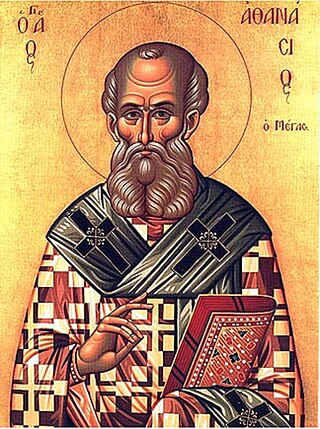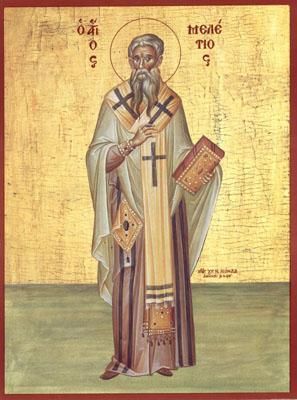
Paulinus II was a claimant to the See of Antioch from 362 to 388. [1]

Paulinus II was a claimant to the See of Antioch from 362 to 388. [1]
Meletius of Antioch had been chosen as a compromise candidate between Catholics and Arians. He was neither a thorough Nicene nor a decided Arian. [2] Members of the Eustathian party objected to Meletius as having been consecrated by Arians, and had begun to meet separately.
Shortly after becoming archbishop, the Arian bishop of Constantinople convinced the pro-Arian emperor Constantius II to exile Meletius back to Lower Armenia and to appoint an Arian bishop to Antioch. Meletius was succeeded by Euzoeus, who was also opposed by the anti-Arians. The synod of Alexandria (362) sent deputies to attempt an arrangement between the two anti-Arian Meletians and Eustathians; but before they arrived Paulinus had been consecrated bishop by bishop Lucifer of Cagliari, thus effecting a schism in the church. [1]
Constantius II died in 361. His successor, Julian, although not a Christian, allowed Meletius to return. There were now three bishops.
Athanasius of Alexandria came to Antioch by order of the emperor, and expressed to Meletius his wish of entering into communion with him. Meletius, ill-advised, delayed answering him, and Athanasius went away having admitted Paulinus, whom he had not yet recognized as bishop, to his communion. The orthodox Nicene party, notably Athanasius himself, held communion with Paulinus only.
Paulinus was "highly esteemed for piety." [1] He was acknowledged as bishop by Jerome, whom he ordained as priest, [3] and by Epiphanius of Salamis. [4] In 374 Pope Damasus I recognized Paulinus as archbishop and made him the papal representative in the East.
In 378, the Western emperor Gratian removed Euzoeus from Antioch, handing over the churches to Meletius. [2] While the imperial court supported Meletius, Rome and Alexandria favored Paulinus. Basil of Caesarea supported Meletius.
His followers were called "Paulinians." [5]
Meletius died in 381; [2] Paulinus in 388. The schism did not end, as each side chose its own bishop. The parties did not reconcile until 415.

Athanasius I of Alexandria, also called Athanasius the Great, Athanasius the Confessor, or, among Coptic Christians, Athanasius the Apostolic, was a church father and the 20th pope of Alexandria. His intermittent episcopacy spanned 45 years, of which over 17 encompassed five exiles, when he was replaced on the order of four different Roman emperors. Athanasius was a Christian theologian, a Church Father, the chief defender of Trinitarianism against Arianism, and a noted Egyptian Christian leader of the fourth century.

The First Council of Nicaea was a council of Christian bishops convened in the Bithynian city of Nicaea by the Roman Emperor Constantine I in AD 325.

The First Council of Constantinople was a council of Christian bishops convened in Constantinople in AD 381 by the Roman Emperor Theodosius I. This second ecumenical council, an effort to attain consensus in the church through an assembly representing all of Christendom, except for the Western Church, confirmed the Nicene Creed, expanding the doctrine thereof to produce the Niceno-Constantinopolitan Creed, and dealt with sundry other matters. It met from May to July 381 in the Church of Hagia Irene and was affirmed as ecumenical in 451 at the Council of Chalcedon.
The 360s decade ran from January 1, 360, to December 31, 369.
Pope Liberius was the bishop of Rome from 17 May 352 until his death. According to the Catalogus Liberianus, he was consecrated on 22 May as the successor to Pope Julius I. He is not mentioned as a saint in the Roman Martyrology. That makes him the earliest pontiff not to be venerated as a saint in the Roman Rite and one of only two popes to be omitted from Roman Catholic sainthood in the first 500 years of church history.
St. Flavian I of Antioch was a bishop or Patriarch of Antioch from 381 until his death.

Saint Meletius was a Christian bishop of Antioch from 360 until his death in 381. He was opposed by a rival bishop named Paulinus and his episcopate was dominated by the schism, usually called the Meletian schism. As a result, he was exiled from Antioch in 361–362, 365–366 and 371–378. One of his last acts was to preside over the First Council of Constantinople in 381.
Eudoxius was the eighth bishop of Constantinople from January 27, 360 to 370, previously bishop of Germanicia and of Antioch. Eudoxius was one of the most influential Arians.

Epiphanius of Salamis was the bishop of Salamis, Cyprus, at the end of the 4th century. He is considered a saint and a Church Father by both the Eastern Orthodox and Catholic Churches. He gained a reputation as a strong defender of orthodoxy. He is best known for composing the Panarion, a compendium of eighty heresies, which included also pagan religions and philosophical systems. According to Ernst Kitzinger, he "seems to have been the first cleric to have taken up the matter of Christian religious images as a major issue", and there has been much controversy over how many of the quotations attributed to him by the Byzantine Iconoclasts were actually by him. Regardless of this he was clearly strongly against some contemporary uses of images in the church.

Eustathius of Antioch, sometimes surnamed the Great, was a Christian bishop and archbishop of Antioch in the 4th century. His feast day in the Eastern Orthodox Church is February 21.

Eusebius of Vercelli was a bishop from Sardinia and is counted a saint. Along with Athanasius, he affirmed the divinity of Jesus against Arianism.

Lucian of Antioch, known as Lucian the Martyr, was a Christian presbyter, theologian and martyr. He was noted for both his scholarship and ascetic piety.
Acacius of Caesarea was a Christian bishop probably originating from Syria; Acacius was the pupil and biographer of Eusebius and his successor on the see of Caesarea Palestina. Acacius is remembered chiefly for his bitter opposition to Cyril of Jerusalem and for the part he was afterwards enabled to play in the more acute stages of the Arian controversy. The Acacian theological movement is named after him. In the twenty-first oration of St. Gregory Nazianzen, the author speaks of Acacius as being "the tongue of the Arians".
Semi-Arianism was a position regarding the relationship between God the Father and the Son of God, adopted by some 4th-century Christians. Though the doctrine modified the teachings of Arianism, it still rejected the doctrine that Father, Son, and Holy Spirit are co-eternal, and of the same substance, or consubstantial, and was therefore considered to be heretical by many contemporary Christians.

Lucifer of Cagliari was a bishop of Cagliari in Sardinia known for his passionate opposition to Arianism. He is venerated as a Saint in Sardinia, though his status remains controversial.
George was the bishop of Laodicea in Syria from 335 until his deposition in 347. He took part in the Trinitarian controversies of the fourth century. At first an ardent admirer of the teaching of Arius and associated with Eusebius of Nicomedia, he subsequently became a semi-Arian, but seems ultimately to have united with the Anomoeans, whose uncompromising opponent he had once been, and to have died professing their tenets.

Alexander I of Alexandria was the 19th Pope and Patriarch of Alexandria. During his patriarchate, he dealt with a number of issues facing the Church in that day. These included the dating of Easter, the actions of Meletius of Lycopolis, and the issue of greatest substance, Arianism. He was the leader of the opposition to Arianism at the First Council of Nicaea. He also mentored his successor, Athanasius of Alexandria, who would become one of the Church Fathers.
The Pneumatomachi, also known as Macedonians or Semi-Arians in Constantinople and the Tropici in Alexandria, were an anti-Nicene Creed sect which flourished in the regions adjacent to the Hellespont during the latter half of the fourth, and the beginning of the fifth centuries. They denied the godhood of the Holy Ghost, hence the Greek name Pneumatomachi or 'Combators against the Spirit'.
Evagrius of Antioch was a claimant to the See of Antioch from 388 to 392. He succeeded Paulinus and had the support of the Eustathian party, and was a rival to Flavian during the so-called Meletian schism.